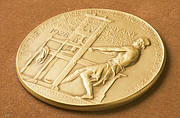Michael Paul Williams wins Pulitzer Prize
Jeremy M. Lazarus | 6/17/2021, 6 p.m.
Michael Paul Williams was at home writing his latest column for the Richmond Times-Dispatch when the newspaper’s managing editor called him with the stunning news: He had just been awarded the 2021 Pulitzer Prize for commentary – journalism’s equivalent of an Oscar.
“Disbelief does not do it justice,” Mr. Williams, 63, said of his reaction after learning on June 11 from Mike Szvetitz that he had been named to receive the award.
“Actually, it was profane disbelief,” said Mr. Williams, a Richmond native who has spent his nearly 40-year career at the newspaper. “My first words were, ‘Are you ... kidding me?’ ”
He said the selection “still seems surreal. It’s an honor just to be nominated.”
He said he never expected that his writing would be selected as the best among his print newspaper peers.
The Pulitzer Prize board, based at Columbia University, recognized Mr. Williams for penning “penetrating and historically insightful columns that guided Richmond, a former capital of the Confederacy, through the painful and complicated process of dismantling the city’s monuments to white supremacy.”
The entry consisted of five opinion pieces he wrote between early June and mid-August last year on the removal of the city’s Confederate statues.
Mr. Williams was among 16 honorees for 2021, the 105th year the prizes have been awarded.
The Pulitzer board also awarded a special citation to Darnella Frazier, the teenager who pulled out her cellphone and began recording when she saw George Floyd being pinned to the ground by a Minneapolis Police officer. Her video helped to launch a global movement to protest racial injustice.
Ms. Frazier, now 18, was cited “for courageously recording the murder of George Floyd, a video that spurred protests against police brutality, around the world, highlighting the crucial role of citizens in journalists’ quest for truth and justice,” the Pulitzer board stated.
The Pulitzer Prizes are named for New York newspaper publisher Joseph Pulitzer, who created them.
Mr. Williams, whose award includes $15,000, is the third Pulitzer winner in the daily newspaper company’s history.
While he is gratified at what the Pulitzer judges had to say, Mr. Williams said he really never knows “how my words are affecting people. One never knows in the process of any your work. My hope is that whoever is assessing it knows it is authentic and heartfelt.”
In the case of the statues, his winning columns did not usher in the change. “People on the street moved those statues,” Mr. Williams said.
However, he sees himself as having helped start the process that led to a profound change in the city’s landscape.
He said he began writing columns advocating for the removal of Richmond’s racist Confederate statues in 2015 after white supremacist Dylann Roof massacred nine Black worshippers and the pastor at Mother Emanuel A.M.E. Church in Charleston, S.C.
“That was a shock to my system,” Mr. Williams said, adding that he wrote the Richmond statues “had to go.”
“My columns didn’t move the needle one bit,” he said with a laugh, but he regards them as part of the process “of chipping away and chipping away at what seems like a stone wall, and then something happens and Stonewall is gone.”
The Stonewall reference is to the statue of Confederate Gen. Thomas J. “Stonewall” Jackson that stood at Monument Avenue and Arthur Ashe Boulevard until July 1, 2020, when it was taken down.
“Change happens incrementally,” he said, and, paradoxically, “all at once. You can never tell when the tipping point is going to arrive.”
While the award represents a personal achievement for him, Mr. Williams said it also represents a validation of the changes at a Richmond newspaper that for decades promoted segregation and for the changes that are transforming once staid Richmond into a more diverse city.
Mr. Williams started out life in the Byrd Park area of the city. His family moved to Henrico County to get away from the destruction and noise that came with living near the area where the Downtown Expressway was being built.
He graduated from Hermitage High School and earned his undergraduate degree in English at Virginia Union University. He earned a master’s degree in journalism from Northwestern University.
He joined the staff of the Times-Dispatch in 1982. His role as a columnist began 10 years later after he successfully pitched the newspaper about the need for greater diversity in local opinions.
He said that he told his bosses that adding him to the panel of columnists would enable the newspaper to better live up to its profession of being open to diverse viewpoints.
“The change was difficult,” Mr. Williams recalled. “There was a lot of pushback and tension. Certainly, there were a lot of unhappy readers.
“This a city with a long history of white supremacy and a long history of being resistant to change,” he said. He said he feels he is part of the movement to create “a more just community.”
Since 1992, he has written more than 2,700 columns that have appeared twice a week.
He said that he is “gratified” for the recognition and the outpouring of congratulatory emails that have come from readers.
He still is pumped about doing columns. He also knows the glow from the award is fleeting. As he put it, “You’re only as good as your last column.”








